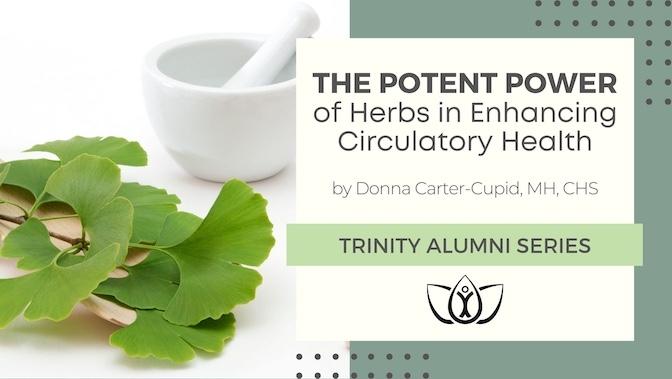 In the quest for optimal health, the circulatory system plays a pivotal role, ferrying life-sustaining nutrients and oxygen to every cell in our bodies. Yet, modern lifestyles and chronic health conditions often impede this vital flow, leading to a myriad of health challenges. But what if the key to invigorating our veins and arteries lay in the very lap of nature? Herbal remedies have been the cornerstone of traditional medicine for millennia, offering gentle yet effective means to support various bodily functions.
In the quest for optimal health, the circulatory system plays a pivotal role, ferrying life-sustaining nutrients and oxygen to every cell in our bodies. Yet, modern lifestyles and chronic health conditions often impede this vital flow, leading to a myriad of health challenges. But what if the key to invigorating our veins and arteries lay in the very lap of nature? Herbal remedies have been the cornerstone of traditional medicine for millennia, offering gentle yet effective means to support various bodily functions. Today, backed by scientific research, these natural allies are gaining recognition for their role in maintaining and enhancing circulatory health. Among the plethora of herbs that have been studied, olive leaf stands out for its remarkable ability to modulate blood pressure. Clinical research has demonstrated that olive leaf extract can significantly lower systolic and diastolic blood pressure, akin to the effects of conventional medications.
Another venerable herb, ginkgo biloba, has been revered for centuries in Chinese medicine for its circulatory benefits. Modern studies corroborate its efficacy in improving blood flow, particularly to the brain, enhancing cognitive function, and potentially staving off age-related decline. As we delve deeper into the verdant world of herbology, it becomes clear that these botanicals offer more than just a placebo effect. They carry the promise of improved circulatory health, with the potential to enrich our lives with vitality and vigor.
Importance of a Healthy Circulatory System
The circulatory system plays a critical role in maintaining overall health by transporting life-sustaining nutrients and oxygen to every cell in the body. This intricate network of blood vessels, the heart, and blood ensures the efficient delivery of essential elements while removing waste products. When the circulatory system functions optimally, it supports cellular health, organ function, and the body's ability to fight infections. However, modern lifestyles and chronic health conditions often impede this vital flow, leading to various health challenges. Therefore, maintaining a healthy circulatory system is crucial for promoting overall well-being and preventing the onset of circulatory issues.Brief Overview of Common Circulatory Issues
Based on general medical knowledge, some common circulatory issues include the following.Hypertension (high blood pressure): A condition where the force of blood against the artery walls is consistently too high.
Hypotension (low blood pressure): A condition where the force of blood against the artery walls is consistently too low.
Coronary artery disease (CAD): A condition where the blood vessels that supply the heart become narrowed or blocked.
Peripheral artery disease (PAD): A condition where the blood vessels that carry blood to the limbs become narrowed or blocked.
Stroke: A sudden interruption of blood flow to the brain.
Heart attack: A sudden interruption of blood flow to the heart.
Atherosclerosis: A condition where plaque builds up inside the arteries.
Deep vein thrombosis (DVT): A blood clot that forms in a deep vein, usually in the leg. Varicose veins: Enlarged, twisted veins that typically occur in the legs.
These are just a few common circulatory issues that can significantly impact overall health and well-being.
The Role of Herbs in Circulatory Health
Herbs have been used for centuries in traditional medicine to support various bodily functions, including circulatory health. Modern research is now providing scientific evidence to support the efficacy of many of these herbal remedies. Studies have shown that certain herbs can help improve blood flow, reduce inflammation, and protect against cardiovascular disease. However, it is important to note that herbal remedies can also have side effects and may interact with other medications. Therefore, it is essential to consult with a healthcare professional before taking any herbal supplements.Historical Perspective on Herbal Remedies
Herbal remedies have been woven into the tapestry of human history, with their roots traced back to ancient civilizations. From the lush rainforests of the Amazon to the serene mountains of Asia, indigenous cultures have harnessed the healing power of plants for centuries. These traditional practices, often passed down through generations, showcase the profound connection between humans and nature.Ancient Egyptians, for instance, utilized garlic and onions for their cardiovascular benefits, while traditional Chinese medicine employed ginkgo biloba to enhance cognitive function and promote circulation. This rich historical legacy highlights the enduring appeal of herbal remedies and their potential to support human health and well-being.
Modern Research Supports Herbal Efficacy
Modern scientific research is increasingly validating the traditional use of herbs for circulatory health. Rigorous studies, including clinical trials and meta-analyses, have explored the potential benefits of various herbs in improving cardiovascular function. For instance, research has demonstrated that olive leaf extract can significantly reduce both systolic and diastolic blood pressure, comparable to the effects of some pharmaceutical interventions.Similarly, ginkgo biloba has been shown to enhance blood flow, particularly cerebral circulation, which can benefit cognitive function and memory. Other herbs, like hawthorn berry, have exhibited cardioprotective properties, including antioxidant effects and the ability to dilate blood vessels.
These findings not only substantiate the historical use of herbs but also provide a scientific basis for their incorporation into modern healthcare practices. However, it's important to acknowledge that research in this area is ongoing, and further studies are needed to fully elucidate the mechanisms of action and potential long-term effects of herbs on circulatory health.
Top Herbs for Circulatory Support
Olive Leaf: A Mediterranean Marvel
Olive Leaf, derived from the olive tree (Olea europaea), has emerged as a potent ally in promoting circulatory health. This Mediterranean marvel, renowned for its therapeutic properties since ancient times, offers many benefits for the cardiovascular system. Rich in bioactive compounds like oleuropein, olive leaf extract has been shown to exert a positive influence on blood pressure regulation.Clinical studies have demonstrated its ability to significantly reduce both systolic and diastolic blood pressure, making it a valuable natural option for individuals seeking to maintain healthy blood pressure levels.
Moreover, olive leaf exhibits antioxidant and anti-inflammatory properties, which can further contribute to cardiovascular well-being by protecting blood vessels from oxidative stress and reducing inflammation. With its multifaceted benefits and time-tested use, olive leaf is a promising botanical for supporting circulatory health and overall vitality.
Ginkgo Biloba: An Ancient Chinese Secret
Ginkgo biloba, a living fossil with a history spanning millions of years, holds a cherished place in traditional Chinese medicine as a symbol of longevity and vitality. With its fan-shaped leaves, this remarkable tree offers a wealth of benefits for circulatory health, particularly in enhancing blood flow and cognitive function.Ginkgo biloba extract, derived from the tree's leaves, contains potent antioxidants and compounds that promote vasodilation, improving blood circulation throughout the body. This enhanced blood flow, especially to the brain, can lead to improved memory, focus, and overall cognitive performance.
Furthermore, ginkgo biloba's neuroprotective properties may help safeguard brain cells from damage, potentially reducing the risk of age-related cognitive decline. With its time-honored use and growing scientific support, ginkgo biloba stands as a beacon of hope for those seeking to optimize their circulatory health and maintain mental acuity.
Hawthorn Berry: The Heart’s Guardian
Hawthorn berry, often referred to as the "heart's guardian," has been a symbol of love and protection for centuries. This time-honored herb, derived from the hawthorn tree (Crataegus species), has a long history of use in traditional medicine for supporting cardiovascular health. Modern research has shed light on its remarkable benefits for circulatory support.Hawthorn berry is rich in antioxidants, particularly flavonoids, which help protect blood vessels from oxidative stress and inflammation. It also acts as a vasodilator, relaxing and widening blood vessels to improve blood flow and oxygen delivery throughout the body.
Studies have shown that hawthorn berry extract can enhance heart function, reduce blood pressure, and improve exercise tolerance in individuals with mild heart failure. Additionally, its cardioprotective properties may help prevent the buildup of plaque in arteries, reducing the risk of atherosclerosis and other cardiovascular diseases.
With its multifaceted benefits and long history of safe use, hawthorn berry stands as a trusted ally in maintaining a healthy and resilient circulatory system.
How to Incorporate Herbs into Your Daily Regimen
Incorporating herbs into your daily regimen can be a safe and effective way to support circulatory health, but it's essential to do so mindfully. Here are some evidence-based tips:Dietary Inclusion: Culinary Herbs: Many herbs can be easily incorporated into your meals. For instance, adding garlic, turmeric, or ginger to your cooking not only enhances flavor but also provides circulatory benefits.
Herbal Teas: Enjoying herbal teas like hawthorn or olive leaf tea can be a pleasant and convenient way to consume these beneficial herbs.
Supplements (Quality Matters): Choose high-quality supplements from reputable brands that undergo third-party testing for purity and potency.
Follow Recommended Dosage: Adhere to the instructions on the product label or as advised by your healthcare professional.
Consider Bioavailability: Some herbs may have better absorption when taken in specific forms or with certain foods. Research the optimal way to take the herb you're interested in.
Precautions and Interactions (Potential Side Effects): Be aware of potential side effects and medication interactions. Some herbs may cause digestive issues, allergic reactions, or interfere with blood thinners.
Consult Healthcare Professionals: It's crucial to consult with your doctor or a qualified herbalist before starting any new herbal regimen, especially if you have underlying health conditions or are taking medications.
Additional Tips
Start Slowly: Begin with a low dose and gradually increase it as needed to assess your tolerance and avoid any adverse reactions.Monitor Your Body: Pay attention to how your body responds to the herbs. If you experience any unusual symptoms, discontinue use and consult your healthcare provider.
Long-Term Use: Some herbs may be safe for long-term use, while others are best used for shorter periods. Discuss the appropriate duration of use with your healthcare professional.
By following these guidelines, you can safely and effectively harness the power of herbs to support your circulatory health and overall well-being.
Conclusion
Herbal support for circulatory health offers a promising avenue for enhancing cardiovascular well-being. Research suggests that herbs like olive leaf, ginkgo biloba, and hawthorn berry can positively impact blood pressure, blood flow, and overall heart function. While these natural remedies show great potential, further research is needed to fully understand their long-term effects and optimal use.As individuals, we can advocate for our health by exploring the benefits of herbal medicine, consulting with healthcare professionals, and making informed choices to support our circulatory systems naturally. By embracing the power of herbs and prioritizing circulatory health, we can pave the way for a healthier and more vibrant life.
Bibliography
Dahmer, S., & Scott, E. (2010). Health effects of Hawthorn. American Family Physician, 81(4), 465-468. Retrieved 7 4, 2024, from https://aafp.org/afp/2010/0215/p465.html
Diane, A., Borthwick, F., Wu, S., Lee, J., Brown, P. N., Dickinson, T. A., . . . Proctor, S. D. (2016). Hypolipidemic and cardioprotective benefits of a novel fireberry hawthorn fruit extract in the JCR:LA-cp rodent model of dyslipidemia and cardiac dysfunction. Food & Function, 7(9), 3943-3952. Retrieved 7 4, 2024, from https://ncbi.nlm.nih.gov/pubmed/27538786
Efentakis, P., Iliodromitis, E. K., Mikros, E., Papachristodoulou, A., Dagres, N., Skaltsounis, A.-L., & Andreadou, I. (2015). Effects of the Olive Tree Leaf Constituents on Myocardial Oxidative Damage and Atherosclerosis. Planta Medica, 81(08), 648-654. Retrieved 7 4, 2024, from https://ncbi.nlm.nih.gov/pubmed/26018920
Lockyer, S., Yaqoob, P., Spencer, J. P., & Rowland, I. (2012). Olive leaf phenolics and cardiovascular risk reduction: Physiological effects and mechanisms of action. Retrieved 7 4, 2024, from https://content.iospress.com/download/nutrition-and-aging/nua011?id=nutrition-and-aging/nua011
Mahady, G. B. (2002). Ginkgo biloba for the prevention and treatment of cardiovascular disease: a review of the literature. Journal of Cardiovascular Nursing, 16(4), 21-32. Retrieved 7 4, 2024, from https://ncbi.nlm.nih.gov/pubmed/12597260
Rigelsky, J. M., & Sweet, B. V. (2002). Hawthorn: pharmacology and therapeutic uses. American Journal of Health-system Pharmacy, 59(5), 417-422. Retrieved 7 4, 2024, from https://academic.oup.com/ajhp/article/59/5/417/5157981 HERBS AND THE CIRCULATORY SYSTEM 11
Siegel, G., Schäfer, P., Winkler, K., & Malmsten, M. (2007). Ginkgo biloba (EGb 761) in arteriosclerosis prophylaxis. Wiener Medizinische Wochenschrift, 157, 288-294. Retrieved 7 4, 2024, from https://ncbi.nlm.nih.gov/pubmed/17704974
Susalit, E., Agus, N., Effendi, I., Tjandrawinata, R. R., Nofiarny, D., Perrinjaquet-Moccetti, T., & Verbruggen, M. (2011). Olive (Olea europaea) leaf extract effective in patients with stage-1 hypertension: Comparison with Captopril. Phytomedicine, 18(4), 251-258. Retrieved 7 4, 2024, from https://sciencedirect.com/science/article/abs/pii/s0944711310002709
Vilaplana-Pérez, C., Auñón, D., García-Flores, L. A., & Gil-Izquierdo, A. (2014). Hydroxytyrosol and Potential Uses in Cardiovascular Diseases, Cancer, and AIDS. Frontiers in Nutrition, 1, 18-18. Retrieved 7 4, 2024, from https://ncbi.nlm.nih.gov/pmc/articles/pmc4428486
Wong, R. H., Garg, M. L., Wood, L., & Howe, P. R. (2014). Antihypertensive Potential of Combined Extracts of Olive Leaf, Green Coffee Bean and Beetroot: A Randomized, Double-Blind, Placebo-Controlled Crossover Trial. Nutrients, 6(11), 4881-4894. Retrieved 7 4, 2024, from https://ncbi.nlm.nih.gov/pmc/articles/pmc4245569
About the Author
 Donna Carter-Cupid is a passionate advocate for natural health and a graduate of Trinity School of Natural Health, where she earned her Master Herbalist (MH) and Certified Health Specialist (CHS) qualifications. She currently runs a part-time home clinic, sharing her expertise with clients seeking holistic wellness solutions. Donna's primary focus lies in herbal education and promoting credible research on the therapeutic benefits of herbs. She believes in empowering individuals with knowledge about nature's pharmacy and its potential to support vibrant health.
Donna Carter-Cupid is a passionate advocate for natural health and a graduate of Trinity School of Natural Health, where she earned her Master Herbalist (MH) and Certified Health Specialist (CHS) qualifications. She currently runs a part-time home clinic, sharing her expertise with clients seeking holistic wellness solutions. Donna's primary focus lies in herbal education and promoting credible research on the therapeutic benefits of herbs. She believes in empowering individuals with knowledge about nature's pharmacy and its potential to support vibrant health.
